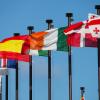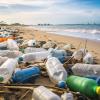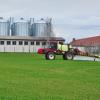The PM Group focusses on solving immediate and near-term environmental (health and ecosystems impacts from pollution), climate (non-CO2 greenhouse gases), and social (widening inequality gaps) problems in a cost-effective way, providing support to policymaking at local and regional scales.
The PM Group addresses sustainability challenges in the near and long term through an improved understanding of the multiple benefits of policies and their distribution across society. The group has a strong focus on the development of new approaches for multi-sectoral policy interventions to manage pollution across different media (air, water, and soil) at various scales to address near-term concerns and enable long-term transformations and their public support towards a sustainable future. In particular, the group endeavors to enhance the systems perspective approach to address and explore issues such as the interactions and environmental impacts of pollution; assessment of sources of non-CO2 greenhouse gases; mitigation opportunities; approaches to address nutrient and material cycling; options for more equitable solutions; and improved methods for estimating the health and economic benefits of policy interventions.
Models, tools, datasets
Policy applications
22 February 2023
Convention on Long-range Transboundary Air Pollution (LRTAP)

22 February 2023
Input to European Union Climate Policies

22 February 2023
European Union Air Quality Policies

Pagination
Projects
Staff
News

28 June 2024
Drowning in waste: pollution hotspots in aquatic environments

12 June 2024
The Global Nitrous Oxide Budget 2024

30 May 2024
New method could significantly reduce agricultural greenhouse gas emissions
Events
Focus

30 March 2024
Transforming waste into a valuable resource
As the world marks the International Day of Zero Waste, Adriana Gómez-Sanabria highlights that the path to zero waste will require a shift in society’s current consumption and production patterns. Originally conceived to shield humanity and the environment from the fallout of our actions, waste management systems must now evolve into engines of sustainability.
04 October 2023
ENGAGE Summary for Policymakers

Publications
Bagheri, M., Gomez Sanabria, A. , & Höglund-Isaksson, L. (2024). Economic feasibility and direct greenhouse gas emissions from different phosphorus recovery methods in Swedish wastewater treatment plants. Sustainable Production and Consumption 10.1016/j.spc.2024.07.007. (In Press) Liu, S., Guo, Y., Wagner, F. , Liu, H., Cui, R., & Mauzerall, D. (2024). Diversifying heat sources in China’s urban district heating systems will reduce risk of carbon lock-in. Nature Energy 10.1038/s41560-024-01560-4. (In Press) Brocza, F. , Rafaj, P. , Sander, R. , Wagner, F. , & Jones, J.M. (2024). Global scenarios of anthropogenic mercury emissions. Atmospheric Chemistry and Physics 24 (12) 7385-7404. 10.5194/acp-24-7385-2024. Gomez Sanabria, A. & Lindl, F. (2024). The crucial role of circular waste management systems in cutting waste leakage into aquatic environments. Nature Communications 15 (1) e5443. 10.1038/s41467-024-49555-9. Zimmermann, S., Kurz, D., Thrippleton, T., Mey, R., Perry, N.T., Posch, M. , & Schweier, J. (2024). Does Soil Acidification Matter? Nutrient Sustainability of Timber Harvesting in Forests on Selected Soils Developed in Sediments of the Early vs. Late Pleistocene. Forests 15 (7) e1079. 10.3390/f15071079.









